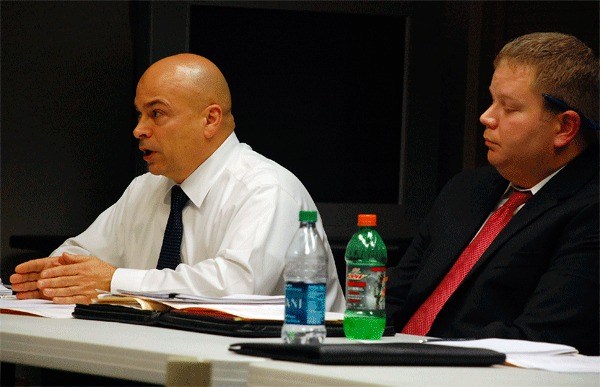A squabble over the calculation of overtime pay has erupted into Whidbey General Hospital union representatives accusing hospital administrators of violating federal labor laws.
The two groups have been quietly debating the issue for the past 15 months but the controversy was brought to public light in dramatic fashion Monday evening when hospital purchasing agent Pat Lamont read aloud a memorandum sent to members of the United Food and Commercial Workers 21 union earlier that morning.
They had been kept in the dark about the pay dispute at the behest of hospital officials.
The memorandum, written by union representative Charles Primm, blasted the hospital’s administrative staff for not making the issue a priority and argued that the neglect has led to the continued underpayment of many union members, despite their entitlements under the federal Fair Labor and Standards Act.
“It’s important for you to understand that these underpayments are not a matter of union contracted premiums being underpaid,” Primm wrote. “In our view these are matters of the hospital violating federal law.”
UFCW 21 is the largest private-sector union in Washington, with over 35,000 members working in grocery store, retail, health care, and other industry jobs, according to the group’s website. It’s one of two unions at Whidbey General Hospital and represents about 300 employees in fields ranging from service and support staff to emergency medical service workers and licensed practical nurses.
Hospital CEO Tom Tomasino told the commissioners that he would not debate whether or not keeping employees in the dark was the right decision. However, he did say that it was done so as not to cause “undue anxiety” among workers because the problem could also mean that employees were overpaid and may owe the hospital money.
He denounced Primm’s memorandum, and its reading at a public forum, as being both unfair and a dirty tactic. The hospital’s attorneys have been working in “good faith” with attorneys from the union to resolve the issue and Primm placed the blame for not informing union workers largely on Carolyn Pape, chief human resources officer for the hospital. Tomasino took exception to that allegation.
“I think it’s unfortunate and really beneath the union to choose a public forum to attack an individual for a decision that she did not make, especially when she’s been an advocate for employees from day one,” Tomasino said.
According to Joe Vessey, chief financial officer for the hospital, the issue began with a grievance filed by a union member in 2009 and solely concerns employees who work more than 40 hours a week. Vessey acknowledged that a problem was discovered and that the solution proposed was to implement a new, and more accurate, automated system.
“We started implementing that software in May of this year and have been on that journey ever since,” Vessey said. “We know that the new solution is intended to be compliant and it’s also going to be the basis for which we evaluate any respective recalculations or settlement.”
He also said that while there have been instances of underpayment, both hospital staff and union officials agree there have also been situations of overpayment. The existing system can’t do a recalculation, and because a case-by-case analysis by hand would be labor intensive, the agreement was to wait until the new system is up and running and a method of recalculation was mutually decided, he said.
But difficulties, largely management training, have arisen and ultimately delayed the new system’s scheduled Dec. 19 launch date. Vessey said the only reason for the delay is “solely related to our intent to ensure accuracy.” He could not say exactly when the system would “go live,” but suggested it would likely occur just after the holidays.
Responding to a question from Commissioner Grethe Cammermeyer, Tomasino reiterated that a recalculation of past wages will be performed to determine which employees were improperly paid, both those who were underpaid and those who got more than they earned.
“We’re trying to do what’s right by our employees,” Tomasino said.



